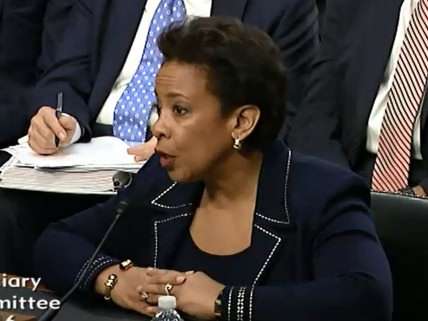The New Attorney General Is Lukewarm on Sentencing Reform
Loretta Lynch's lack of enthusiasm could make it harder to pass a decent bill.

After the Senate voted to confirm Loretta Lynch as attorney general yesterday, Ed Krayewski noted some reasons why civil libertarians might be less than enthusiastic about Eric Holder's successor, including her fondness for asset forfeiture and her inaction in the Ramarley Graham case. Today's New York Times provides further grist for grumbling, noting that Lynch plans to make nice with police, not only opposes marijuana legalization but thinks marijuana is more dangerous than alcohol, and notionally supports sentencing reform but is less passionate on the issue than Holder.
Lynch's intent to "strike a new tone" with police (as the Times puts it) may amount to little more than a rhetorical shift. Similarly, her disagreement with the man who appointed her about the relative hazards of marijuana and alcohol, although it suggests she is either misinformed or dishonest, probably won't have much impact on Justice Department policy. It seems unlikely that the DOJ will suddenly shift course and try to shut down the newly legal marijuana industries in Colorado and Washington (soon to be joined by Alaska and Oregon). But I do worry that Lynch's lack of interest in sentencing reform will make it harder to pass a decent bill.
Holder's seemingly sincere concern about excessively harsh criminal penalties was one of the few bright spots of his time in office. He joined President Obama in supporting shorter prison terms for crack offenders in 2010 and, beginning in the summer of 2013, highlighted the issue of overincarceration, declaring that "too many Americans go to too many prisons for far too long, and for no truly good law enforcement reason." And he actually did something about it, issuing charging guidelines that help some drug offenders avoid mandatory minimums and reinvigorating a clemency process that had been all but moribund since Obama took office. But the impact of those steps will be modest compared to what new legislation could accomplish.
Holder supported the Smarter Sentencing Act, which would help thousands of current prisoners and future defendants by making the 2010 reductions in crack sentences retroactive, cutting mandatory minimums for various drug offenses in half, eliminating the mandatory life sentence for a third drug offense, and expanding the "safety valve" for low-level, nonviolent offenders. The Times, citing unnamed "aides," says Lynch also supports the bill, but "it is not a personal passion for her as it was for Mr. Holder…and it is not clear that she will make the bill an early priority." Although the bill has support in both parties, it has met with predictable opposition from mindless "tough on crime" politicians such as Senate Judiciary Committee Chairman Chuck Grassley (R-Iowa). Lukewarm support from the new attorney general will only make the bill's prospects iffier.


Show Comments (20)